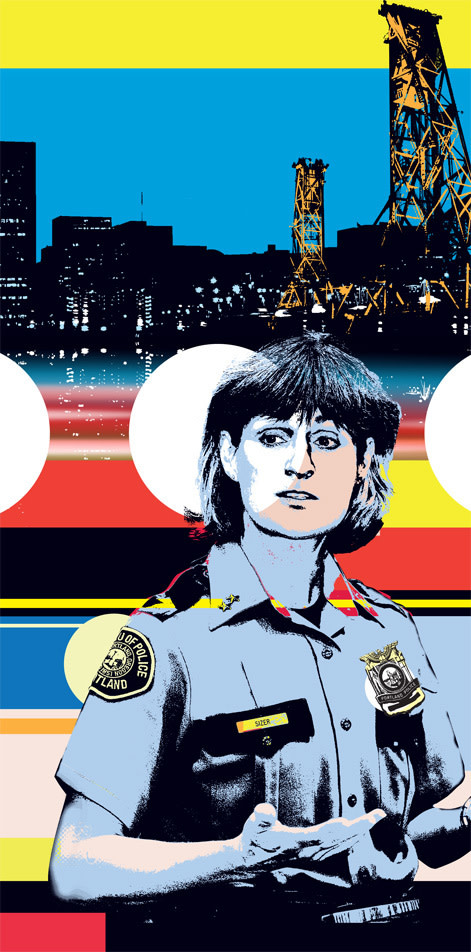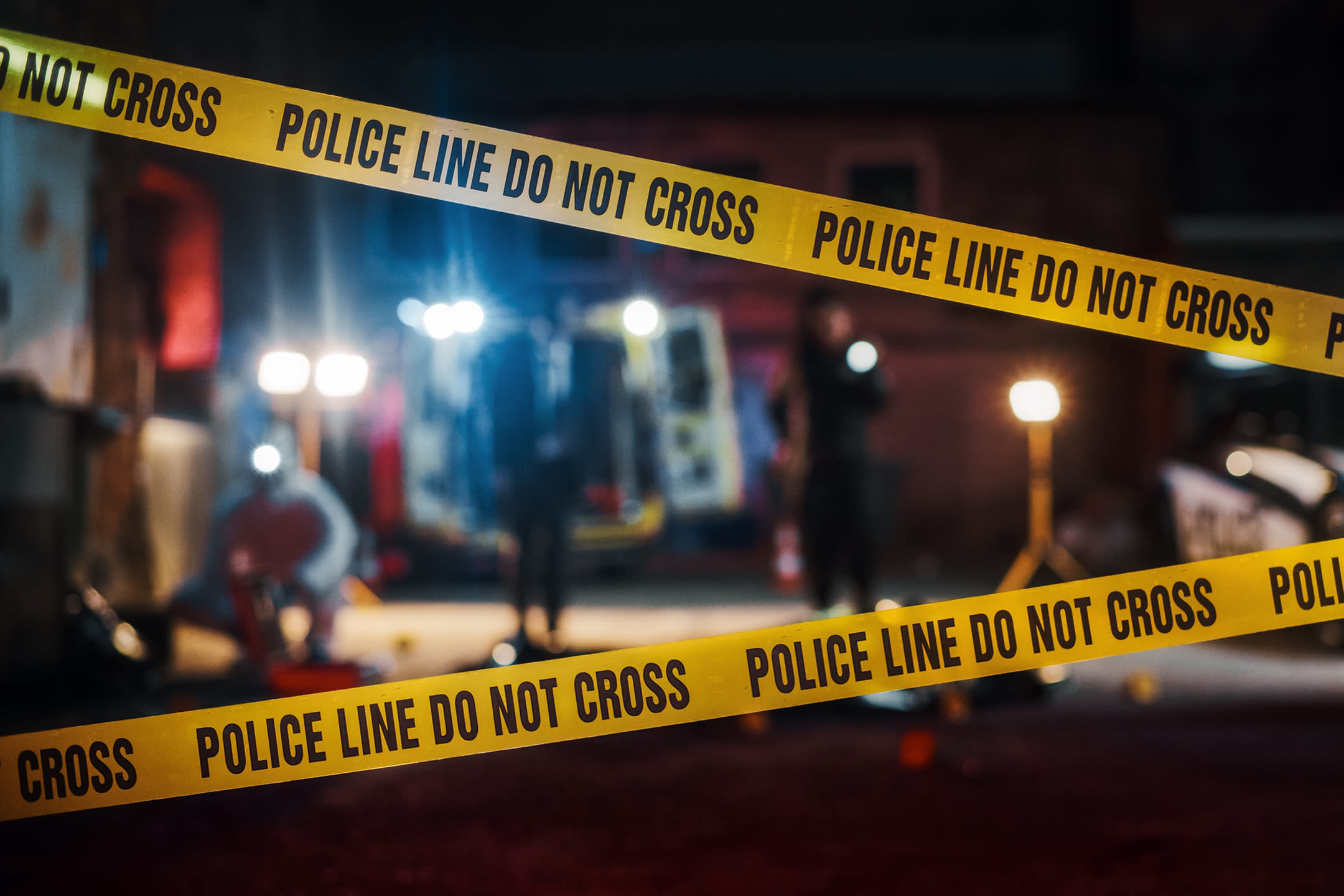Rosie Sizer

Rosie Sizer became Portland’s police chief in 2006, during a scandalous sexual harassment investigation against then-Chief Derrick Foxworth. Sizer, fifty, is a native Portlander, a Portland State University graduate, and the daughter of a career cop; she worked her way up from street patrol to command a bureau of some thirteen hundred officers and staff. “[Being a police officer is] almost intoxicating because you’re … seeing parts of life and the way people live and behave that you ordinarily aren’t exposed to in your normal life,” she has said. “The challenge is to balance that intoxication with the rest of your life, so that the job doesn’t start to control you.” She once told Willamette Week that as chief of the Portland Police Bureau, the prospect of terrorism or natural disaster most worried her because either would “strain our resources, kind of shatter the sense this community has of itself.” Lately, though, gang violence and a budget crisis have demanded her attention. We sat down with her in late March for a check-in.
When the Derrick Foxworth scandal was unfolding three years ago, Mayor Tom Potter summoned you from the shooting range to name you acting chief. I remember watching the press conference: you were wearing a sweatshirt, fatigues, and combat boots, and you looked a bit shell-shocked.
It was very unexpected. He didn’t give me much turnaround time to tell him whether I was going to accept or reject the job. We met at two o’clock in the afternoon, and he said there was going to be a four o’clock press conference.
What did you think when the mayor first said, “Rosie, I’ve got a job for you … ”?
I was thinking, “That’s not a job I ever expected to get nor ever particularly desired, and it’s a really risky job.” I have been a police officer since 1985; I’d seen many chiefs come and go. I said [to myself], “You know, it’s a risky job, but not in the way that you face risk every day.” When was the last time you ever heard of a police chief dying in the line of duty? In a role like this, the thing you risk is abject public humiliation, and you can survive that.
Between December 2008 and this March, the city’s Gang Violence Response Team responded to more than twenty incidents of gang-related violence on the East Side, compared to just thirty incidents in all of 2006, the year you became chief. What’s responsible for this spike? And what’s your plan for dealing with it?
You have to look at this from an academic and sociologic perspective to really uncover all the reasons why young people may choose, or feel impelled into, a gang lifestyle. But part of what we’re seeing is that there’s a bit of a population bubble—we have a larger number of kids coming of age. It’s like an echo generation from the baby boom. There was the baby boom and their kids, and now we’re seeing their kids. Now that [gang violence is] generational, it’s become a concern, because just as with generational poverty, it’s harder to intervene [when the decision to join a gang is generational].
Is the violence confined to one area, like inner Northeast Portland?
I was a street officer when we saw the first wave of gang violence in the 1980s, and it was confined to relatively small sections of North and Northeast Portland. Columbia Villa was gang infected—areas around N Kerby Avenue, Woodlawn Park. So it was a relatively small epicenter of gang activity. Over the last twenty years, gang behavior and gang associations have migrated throughout the entire metropolitan area, so it’s not really a City of Portland problem anymore, it’s a regional problem that includes the cities of Vancouver, Gresham, Hillsboro, Beaverton, and beyond.
So how did you address it twenty years ago? Are you following the same plan as then, or have you changed tactics?
The dispersal has affected our strategy. When I became chief, law enforcement leaders from across the region entered into an agreement, creating the Metro Gang Task Force. The idea behind that is to look at [gang activity] regionally rather than having our strategies stop at jurisdictional lines. That’s one strategy that’s different. Over the late 1990s and early years of this century, we gained great success with what we called our Gang Violence Response Team. If there was an incident of gang violence, we responded extremely promptly, investigated intensively, and brought in many cases with a success rate unmatched in other jurisdictions—we brought people to justice and thereby broke the cycle of violence. So you wouldn’t have a shooting, then a shooting related to that shooting, and a shooting related to that shooting. If we could respond, intervene, and arrest, there was less tit-for-tat violence. In the waning months of last year and early this year, we found that that strategy was not getting ahead of the violence, and we decided in January to put more emphasis on street-patrol activities with Operation Cooldown.
Operation Cooldown?
A monthlong, intensive street-intervention strategy. [The initiative followed a spike in gang-related shootings set off by a December 12 killing during a funeral at a North Portland church.] Officers patrolled hot spots like the King School Park or the East Portland and Rockwood areas to get ahead of the violence. It was more proactive. We’re instituting an afternoon shift patrol as part of the gang team; we’ve [also] shored up investigations [by moving] a sergeant and two more detectives to the gang team. And we’ve shored up the proactive uniform patrol, putting more people on the street. However, I think we all recognize that you can’t defeat gang violence only with law enforcement.
In terms of sheer numbers, are we seeing more or fewer incidents of gang violence than other cities in America?
I don’t mean to diminish our problems in any way, but there are other cities that would be envious of our violent-crime numbers, because they are quite low for a city of our size, and that’s inclusive of gang activity. Cincinnati, comparable in size to [Portland], had fifty-one homicides in the first six months of 2007 and fifty-six in the first six months of 2008. The number in Portland in the first six months of 2007 was fifteen; in [the same period of] 2008, we had thirteen. In most of the country, crime has been trending downward, but in some places, it’s been trending upward. Chicago is having a very bad year for homicides. Washington, DC, has had problems. So far in Portland, we’re doing quite well.
How well, overall?
In the last ten years, person crimes [rapes, homicides, robberies, aggravated assaults] are down 50 percent, and property crime [burglary, larceny, vehicle theft, shoplifting, and arson] is down more than 25 percent. If you watch the nightly news, you’d believe it’s all crime, all the time, but if you [look at] public safety on a per capita basis today as compared to ten years ago, we’re in much better shape.
Why do you think that is?
People are exercising greater crime-prevention techniques. Homes are harder to break into now, and people are generally more conscious of their personal safety. But some of it has to do with the economic vitality we’ve experienced over the last ten years or so. There’s greater affluence in this city than there was formerly.
So if the crime rate dropped when the economy was booming, shouldn’t we expect to see a surge in crime as the economy trends downward?
Probably less than you would expect. In the first eleven weeks of this year, which has been economically very challenging—our unemployment rate is over 9 percent [in the weeks after this interview, the unemployment rate rose to more than 10 percent]—overall crime is down 11 percent compared to the same period last year. I think there’s some bit of mythology that in a recession, crime goes up. What we are seeing and hearing about during this recession isn’t that theft numbers and burglaries are going up, it’s really about fraud—not identity theft so much as scammers. All kinds of scammers are out there. It’s important that people hear about those scams and protect themselves.
How has the recession affected the police bureau’s budget and staffing?
As a city bureau, we’ve been asked to prepare budget-cut packages of 2.5 percent to 5 percent—that’s $3.5 million to $7 million. As an organization, we are requesting that if we [implement] a 2.5 percent cut, we do that by restructuring precincts. We did an elaborate budget process with a lot of community input and validated that our core mission is delivering frontline police services. So, we’re loath to cut street officers and are recommending that we restructure from five precincts to three precincts [eliminating the North and Southeast precincts], cutting command supervision and administrative support positions but leaving street officers intact. We don’t have much more capacity to cut into the infrastructure of the organization.
Scott Westerman, president of the Portland Police Association, has taken the city to task for not putting enough officers on the street, particularly in response to gang violence.
The landscape is more complex than that. Better staffing in the police department would be greatly welcomed and a relief. But gang violence is about more than just an enforcement response; it’s about a community response. One of the things I’m most afraid of at the moment is not so much the cuts to the organization, because if we’re smart about the cuts, we can continue to deliver very good service. It’s the cuts that are happening upstream and downstream that concern me.
What do you mean by “upstream and downstream”?
In the Oregonian this morning, there was an article about cuts to drug treatment programs. There are cuts that are occurring in the mental health system in this state, which was in some peril even before these cuts. Those are cuts that are happening upstream from us. Downstream, the district attorney’s office is looking to lose fourteen to seventeen deputy district attorneys. [These attorneys prosecute crimes.]
So what’s going to happen?
I feel very sorry for street officers. In a way it’s going to feel like they’re the Dutch boy putting their fingers in the dike. The role they play is critical both in responding to emergencies, responding to violence, providing order on the streets, and in providing community problem-solving, but they’re only one part of a much larger and more complex system. Police officers are the people who respond to someone’s crisis. They are the visible representation of public safety, and the expectation is that we can fix everything, but if the other systems aren’t functioning, there’s only so much [police] can do. It’s our partners in drug and alcohol treatment, mental health treatment, the district attorneys, and the jail system who are in greater peril than we are at the moment. It’s a pretty concerning time in terms of the larger forces at work, because of the economic downturn.
When President Bush senior visited in the early 1990s, his Secret Service agents nicknamed Portland “Little Beirut” because of the clashes they saw between protestors and police officers. Do you feel that most Portlanders appreciate the job your department does?
As an individual, I have the respect of the community. I often hear from community members that they think I’m doing a great job. My standard response is, “Please say that to the officer on the street. They’re the ones who don’t hear it enough.” I think it’s easy to single me out and like me for how I present myself on TV or for whatever reason, but the officers on the street need the acknowledgement from the community they serve. They would appreciate feeling better supported than they sometimes do. It sounds kind of trite, but it is a partnership, it is a relationship. We’ve been working hard to nurture that relationship, but it takes more than our energies to make it happen.
On your second day as chief, your husband, former Multnomah County Sheriff Dan Noelle, asked how you were feeling. By that, he meant that when you first become chief, it’s a big ego boost, but over time the ego can get pretty bruised.
That was a great reminder at a very good point that it really isn’t about me—it’s about the job you’re doing for the organization and the community. You have to check your ego at the door; you need to have a sense that you’re doing the right thing for the right reason, and it really isn’t about you.
Is Portland safe?
It is. Sometimes residents tend to be very critical of Portland, but when I talk to people from out of town, they’re struck by the vibrancy of this city, by the fact that downtown doesn’t get abandoned at five o’clock, that it’s a living, breathing space at all hours of the day. That is something that’s very different than other cities in this country.




